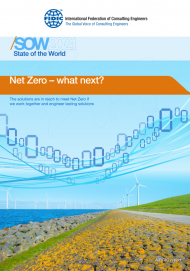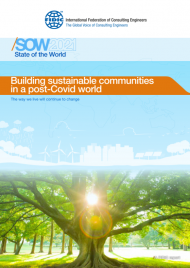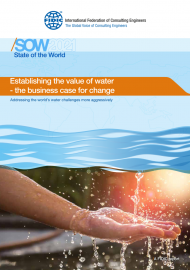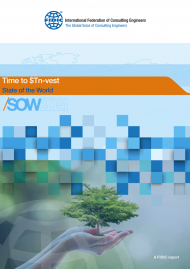Go to the latest report
Coming soon - Click here to go to the page of the latest report in the State of the World series
Get involved - SOW partner
Click here to register your details to receive updates on FIDICs Policy and Advocacy work
Register for the next Webinar
Click here to register for the upcoming State of the World webinars
State of the World Series - 2023 Update - Corruption, its effects and the need to take action
We are pleased to present the first update to the recently relaunched State of the World series. In 2022 we produced the first State of the World anti-corruption report and it reminded us that corruption is still a real and significant issue.As evidenced by international public law and the domestic laws made according to the public policy of nation states, corruption is not and should not be acceptable. This State of the World report update uses the latest information to update our 2022 analysis and outlines figures on its effects, considers the relationships between economic, industry and Foreign Direct Investment (FDI) flows and the perceptions of corruption.State of the World Series - Developing tomorrow’s sustainable energy systems
In 2023, FIDIC celebrates its 110-year anniversary and this milestone is one to celebrate but it is also a reminder that, whilst history is important, we also need to continue to look forward.In this report, FIDIC, the International Federation of Consulting Engineers, underscores its pivotal position in the realm of sustainable infrastructure and engineering solutions. FIDIC takes a staunch stance on the role of infrastructure in advancing global sustainability, emphasising the importance of aligning projects with the UN sustainable development goals (SDGs). The organisation advocates for an approach that engages engineers in the earliest stages of project conception, with a heightened focus on societal and community impact.State of the World Series - Digital Technology on a Path to Net Zero
In 2022 FIDIC produced its Digital disruption and the evolution of the infrastructure sector State of the World report. This report outlined not only the pace of change but also the role of technology as a potential disrupter to industries changing their business model as a result of shifts in technology, data and/or how a combination of how customers/clients and the sector can access and use such information. It is, however, not only important to recognise that change is constant, but also that if we are going to meet challenges such as net zero, it is inevitable. In this latest State of the World report, we explore the practical role technology currently has in the development of infrastructure and also how this will change as we move forward with increased retrofitting, carbon reduction and increasing cooperation.
& Sophia Harlow
State of the World Series - Corruption, its effects and the need to take action
As evidenced by international public law and the domestic laws made according to the public policy of nation
states, corruption is not and should not be acceptable. This report outlines figures on its effects, considers
new relationships between economic, industry and FDI flows and the perceptions of corruption. The report
looks at data collected over the last decade across as many countries as possible and asks the question, how
has the fight against corruption gone? Are we really combatting it?
State of the World Series - Digital disruption and the evolution of the infrastructure sector
This report explores the pace of this technological change and shows that not only is the pace of change significant, but that many of the technology companies we use today for day-to-day activities in the grand scheme of time are actually very young and company longevity is continuing to decline. This suggests that not only is the pace of change faster, but the companies and people we deal with today may not be the ones we are dealing with in ten years’ time. We also discuss the role of technology as a potential disrupter to industries changing their business model as a result of shifts in technology, data and/or how a combination of how customers/clients and the sector can access and use such information. It is then also important to look at the role of technology as an innovator and as something which drives real changes and improvements. What does it mean in terms of big data, artificial intelligence, customer lead data and more devolvement of smart devices?
State of the World Series - Net Zero - What Next?
 Net Zero. It could be argued that we have only just begun, but such ambitions were set decades ago. Yes, to hit a target you first have to create one and to reach that target you have to gain acceptance, political support, industry support and then delivery through all related activity. FIDIC, as the global voice of engineering and infrastructure, asks not only what is next but we also provide the next global target. This target not only helps to achieve our current trajectory but also sets the kind of ambitions the engineering sector and humanity should be proud to achieve. We go beyond Net Zero and ask “what next?” Find out more about what comes next after Net Zero by attending the launch of “Net Zero . . . so, what next?”, the fifth report in the FIDIC State of the World series.
Net Zero. It could be argued that we have only just begun, but such ambitions were set decades ago. Yes, to hit a target you first have to create one and to reach that target you have to gain acceptance, political support, industry support and then delivery through all related activity. FIDIC, as the global voice of engineering and infrastructure, asks not only what is next but we also provide the next global target. This target not only helps to achieve our current trajectory but also sets the kind of ambitions the engineering sector and humanity should be proud to achieve. We go beyond Net Zero and ask “what next?” Find out more about what comes next after Net Zero by attending the launch of “Net Zero . . . so, what next?”, the fifth report in the FIDIC State of the World series.
State of the World Series - Building sustainable communities in a post-Covid world
 The world is gradually learning what it means to be sustainable as we march towards achieving the 2030 UN Sustainable Development Goals and approach net zero, but should we simply be adapting our current way of living or thinking about a new way of life? The Covid pandemic has demonstrated that remote working is not just the digital dream of IT professionals and visionaries, but is and can be real life. Do we need cities? Is urbanisation going to continue? Alternatively, should we be looking at the airline industry and the ‘hub and spoke’ model as the future for communities where most activity can happen locally in a more sustainable way via serviced offices, with only occasional visits to major hubs? The world is changing and this State of the World report asks: “are we changing quick enough to match the way communities want to live not only tomorrow, but today?”
The world is gradually learning what it means to be sustainable as we march towards achieving the 2030 UN Sustainable Development Goals and approach net zero, but should we simply be adapting our current way of living or thinking about a new way of life? The Covid pandemic has demonstrated that remote working is not just the digital dream of IT professionals and visionaries, but is and can be real life. Do we need cities? Is urbanisation going to continue? Alternatively, should we be looking at the airline industry and the ‘hub and spoke’ model as the future for communities where most activity can happen locally in a more sustainable way via serviced offices, with only occasional visits to major hubs? The world is changing and this State of the World report asks: “are we changing quick enough to match the way communities want to live not only tomorrow, but today?”
Tackling the global water crisis
 This report is part of our effort to explore how engineers and the wider infrastructure sector can help address the global water crisis.
This report is part of our effort to explore how engineers and the wider infrastructure sector can help address the global water crisis.
Water, it falls from the sky, runs in our rivers, fills our lakes, waters our crops and flows through our infrastructure, yet it is more than a monetary product. Yes, having explored the value of water in our second State of the World report, we explore the flip side of this equation. The environment we live in, the pollution that has historically occurred and minimising such pollution in the future, is becoming more important day by day. The SDGs make this clear, but how can industry stand up and lead the way.
Establishing the value of water - the business case for change
 This report is part of our effort to more broadly communicate ‘state of the world’ issues that engineers can help address.
This report is part of our effort to more broadly communicate ‘state of the world’ issues that engineers can help address.
This report includes a discussion of issues related to the value and pricing of water services, which going forward must meet a very important, delicate and critical balance, between providing services universally to meet the SDGs, improve livelihoods, food, energy, health etc as a necessity but using policy and pricing mechanisms which allow significant investment to take place without pricing people, towns, areas or even regions out of vital services. We also note issues related to the financial and social costs of our water challenges which are not routinely ‘priced’.
Time to $Tn-vest
 Covid is probably the greatest challenge the world currently faces. Expenditure on support mechanisms has been significant and just as infrastructure was recovering from the last financial crisis there is potential for further turmoil.
Covid is probably the greatest challenge the world currently faces. Expenditure on support mechanisms has been significant and just as infrastructure was recovering from the last financial crisis there is potential for further turmoil.
The infrastructure sector, whilst being a catalyst for growth and producing positive economic effects, may have to face head-on the realism of the investment challenge at potentially even more constrained times.
The cost of these crises is significant and we need to meet these challenges. It is, therefore, Time To Take The Trillion Task seriously - yes one T for every $trillion of investment that is estimated to be needed as a minimum to meet the SDG requirements. It is truly Time to $Tn-vest!
Partners of the State of the World Series

The Sustainable Infrastructure Partnership was started by UNEP in 2018 as a platform to promote and support integrated approaches to sustainable infrastructure planning and development, this recognizes the centrality of infrastructure to the 2030 Agenda for Sustainable Development.
In collaboration with a broad range of stakeholders, including FIDIC, the SIP provides knowledge, facilitates international collaboration, and supports capacity building at the country-level to foster systems-level approaches, which more fully exploit the complex interlinkages between infrastructure and the SDGs.
UNEP will in February launch the Good Practice Principles for Sustainable Infrastructure and a collection of illustrative case studies and therefore is glad to support FIDICs State of the World program going forward as we both aim to help governments adopt integrated approaches to sustainable infrastructure.






